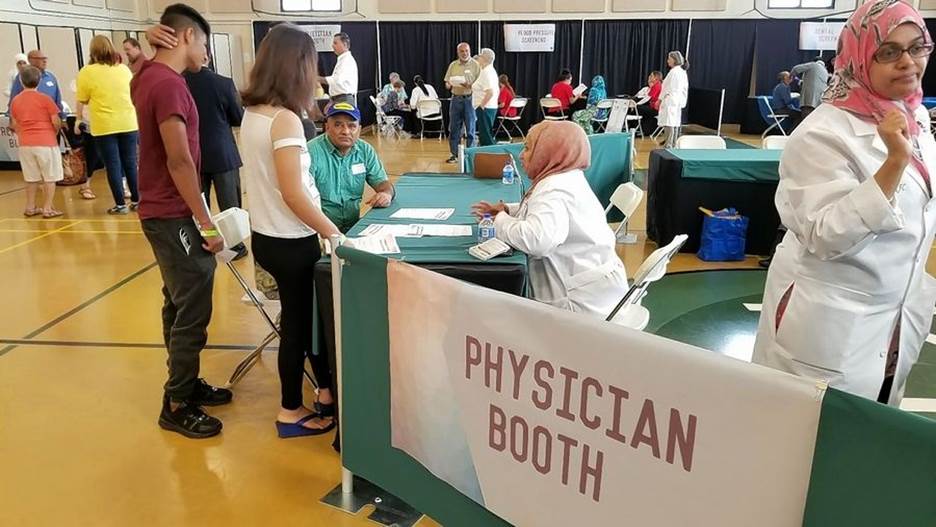

Benefits of Masjid-Sponsored Health
By Mahasin D. Shamsid-Deen
Chicago, IL
“Oh You who believe . . . help one another in piety and goodness and do not help one another in sin and aggression, and be careful of your duty to Allah, surely Allah is severe in requiting.”
(Qur’an 5:2)
The local masjid or Islamic center provides for the needs of the believers who regularly attend. Some centers have a completely inward focus, with activities limited to Islamic study or Muslim celebrations. But there is so much more that can be offered. Remember, most Masjids or Islamic centers are located on a piece of property that includes a building. That property can be repurposed as necessary. Health fairs are a wonderful way to use the building, parking lot, or grounds of a Masjid or Islamic center for an overall good.
A Healthy Muslim Community
- A health fair annually or every few months benefits the Muslim community because members have opportunities for health screenings and access to educational materials.
- It increases awareness of health and wellness resources within your area
- It increases knowledge and understanding of personal risks
- It reminds Muslims to make positive health behavior changes in their lives
Information to the Surrounding Community
- At its core, a health fair provides information and opportunities for health care. Sometimes people new to an area, low-income citizens, or people with language or cultural barriers may not even know what health resources are available. The Masjid Islamic Center would be deemed a reliable source of information.
- The most common screenings at health fairs include blood pressure, cholesterol, blood glucose for diabetics, lead levels and overall fitness.
- Take advantage of ‘monthly’ themes. For example, October is Breast Cancer Awareness Month, so a health fair can invite professionals with information on the disease, its prevalence, preventative measures, and even places and costs for mammograms.
Dawah
- Health fairs help establish trust with the outer community of residents who live nearby. They will begin to see the Muslims as an information resource.
- Participants will gain all the benefits as listed above.
- Volunteers can dress alike and demonstrate how vibrant the Muslim community can be.
Partnerships
- Health fairs build relationships with other 501c3 and health agencies in the area.
- Community health centers, doctors, nurses, public health departments, and health-oriented businesses look for opportunities to share the knowledge of the services they offer.
- These partnerships may be valuable later if someone needs a particular health service and the Masjid or Islamic Center feels confident to recommend a professional who understands and/or has been exposed to the particular needs of Muslims (this may include extra modesty for the women or pork-free insulin for the diabetic.).
Engages Volunteers
- One of the greatest benefits of establishing a health fair is that it engages the members of a particular community to work together. As Muslims, we are instructed in the Qur’an to work together in doing good deeds. A health fair takes planning and people power to be successful.
- In addition, people can use their talents. Nursing students, youth group members, senior citizens, retired Muslims, housewives, physically disabled Muslims all have an opportunity to contribute. Volunteers can learn the value of giving. They can share their knowledge or learn new skills.
Teaching Moments
- Since hosting a health fair requires some forethought, volunteers will learn or hone their skills with planning, budgeting, and strategizing.
- Project leaders can learn how to recruit, retain, and acknowledge volunteers.
- Volunteers learn business and marketing techniques as they advertise and raise awareness of the health fair.
- Strategists learn how to set up and break down events. (This is an especially useful skill for American Muslims who often have ‘Eid’ fairs in a large space other than the Masjid. A volunteer who has set up and broken down for a health fair learns how to effectively use space and time)
- Respecting others and holding private information in confidence is an unrealized skill learned by working at a health fair.
Hub
- The effort and activity needed for a successful health care fair brings people together. This may include non-Muslims in the neighborhood who may want to volunteer. The key is that it affords opportunities for continual activity at the Masjid or Islamic center, making it a hub.
- Also, don’t be afraid to be creative with the health fair. There are many activities that can be provided like healthy cooking demonstrations, CPR and first aid training or demonstrations, exercise movements or even martial arts or self-defense demonstrations. There are many ways to help others understand the benefits of good health and how to attain it.
Fun
- A health fair can include games that encourage the participants to stop by each booth or partake in the screening opportunities.
- Health care vendors can provide incentives that educate and motivate the attendees.
- If the health care fair has physical activities or games to demonstrate how to exercise or burn calories, the attendees may develop friendships and good feelings towards other attendees or the sponsor itself.
Annual Report
- Most Masjids or Islamic centers are registered non-profit entities which require an annual report that must be turned in to the IRS. An annual health fair can be listed as an educational, charitable or social benefit activity in the report.
- The health fair helps the administration of Masjids or Islamic centers practice the skills of scheduling, budgeting, and transparency.
Charitable Deeds
- As Muslims we are instructed in the Qur’an to do good deeds (2:110), provide charitable deeds (2:274), and perform neighborly deeds (Sura al Ma’un, chapter 107 of the Quran).
https://www.soundvision.com/article/benefits-of-masjid-sponsored-health?eType=EmailBlastContent&eId=51f75b4c-f386-42ca-a9fd-6a76dc6269d4
-----------------------------------------------------------------------------
Back to Pakistanlink Homepage
|

